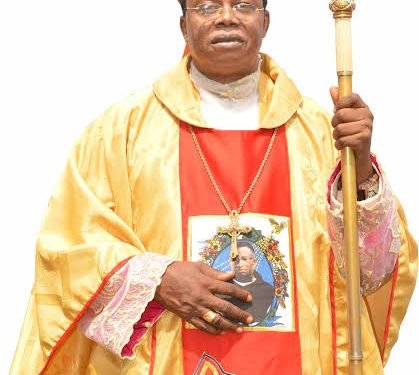By Jude Michael
The Catholic Bishop of Awka Diocese, Most Rev Dr Paulinus Ezeokafor, has appealed to the federal government to channel resources to the provision of basic amenities and infrastructure that can touch positively the lives of Nigerians instead of remaining in the corruption-stricken old order of money-sharing under the guise of palliatives to cushion the effect of fuel subsidy removal.
The Catholic Bishop, who made the appeal last Tuesday in his office while reacting to the proposed N500 billion palliative by the federal government for 12 million poor families in the country, said revamping of the nation’s moribund refineries, subsidizing agricultural inputs, setting up public mass transit systems across the nation, among others, by the federal government, were a viable means to alleviate the sufferings of the people.
The prelate, who felt embittered by the planned N500 billion palliative said, ‘On the 29th of May this year, a new government led by Ahmed Bola Tinubu was born in the country.
‘In his inaugural speech, one of the things he mentioned was removal of fuel subsidy which I believe every Nigerian knows full well that its background as a whole is tricks and cheating.
‘People said that it is in order because, instead of the fuel subsidy benefitting the masses, it only benefits the affluent in our society – and this is the centre of corruption in this country, according to information.
‘To us, his pronouncement that fuel subsidy had gone was a bitter pill because people would face difficulties.
‘Personally, I expected that before making such a statement, there should have been something put in place, but that was not done. However, as time went on, the president started talking about palliatives and I was highly impressed.
‘However, when this issue of palliative came up, I heard that a family would be given N8, 000 per month to sustain themselves. Then, you can see the power of N8, 000 for an average family of six persons.
‘Then worse still, this palliative exists for six months and, after that, what next?
‘Also, my thinking is they are continuing to go the same old way. When you look at the past, you will see how it happened. They did the one they called a home-grown school feeding programme. There, we were told that the students were fed; even during the time they were out of school during the period of COVID-19. During the same COVID-19 period, they told us that some people in the villages were given money through their bank accounts. So, how many of the people in the villages have a bank account?
‘I got disgusted and upset when I read that in the palliative, the senators would receive about N40 billion and House of Reps members about N30 billion. For what? Do they belong to the poor class? If they do, Nigeria is finished already because you know what they take home a month.
‘However, we had expected that the senators and the House Reps members, on their own, would have suggested to the government to exclude them from this arrangement. This would have given them a very wonderful representation.
‘Nevertheless, I still expect them to dissociate themselves from benefitting from that money; exclude me too. If they don’t, it means they have lost everything like conscience.
‘Also, I expect the opposition parties, the People’s Democratic Party, the New Nigerian People’s Party and the Labour Party, to make a reaction.
‘And to the government, this money-sharing is not a solution. The solution to our problem is, what is the problem of our refineries? Why can’t our refineries work? Does it mean that our refineries can’t come back to life again? If it does, this is the time. So, use that money to put the refineries in order,’ the prelate advised, while emphasizing on the need to grant individuals license to build modular refineries.
He further suggested, ‘On the other side is the transportation of our people. What prevents the government from taking this money maybe for every state, 20 buses – to be plying in the major streets in the state. The effect will touch every individual.
‘Again, agriculture – empower the farmers; put security to the farming areas to make the areas safe.’
He empathetically begged the government further to have a rethink on how to use the proposed N500 palliative on improving electricity, water, health, education, among others, already in the system, for the common good of the people.
He noted that once it was done, everything would be settled. ‘But if you are talking about giving money – even if it will be N200 thousand per family a month, it will not solve the problem,’ Bishop Ezeokafor said.
The chief shepherd of Awka Catholic Diocese also enjoined Nigerians to have hope, and continue to pray for a better Nigeria and urged them to always speak out when things were not going normal and to let the authorities know that they were not doing well.
While asking God to continue to sustain the nation as one entity with peace, the prelate prayed for grace upon Nigeria’s ruling elite to enable them to take responsibility for taking care of the common good of the people and to ensure that they did not only do their best, but also make sure that their best was good enough for the people.







































